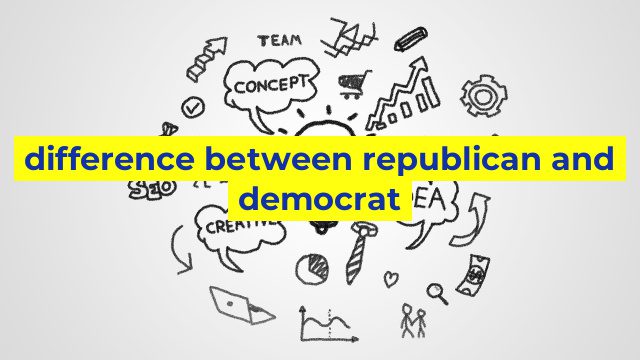The Difference Between Republicans and Democrats
When it comes to political parties in the United States, two of the most prominent and, often, controversial are the Republican and Democratic parties. These two parties have different political ideologies, beliefs, and views on important issues that affect the country’s governance. Understanding the difference between Republicans and Democrats is essential to help garner a better understanding of the American political landscape.
The Basic Differences
The Republican party is conservative and believes in limited government intervention, lower taxes, individual freedom, and personal responsibility. On the other hand, the Democratic party is more progressive and advocates for a more active government, higher taxes on the rich, more social programs, and equality for all individuals.
Economic Policy
Republicans typically support laissez-faire economic policies. They believe that with a free market, businesses can best serve the economy by creating jobs and innovations. They seek to minimize economic intervention by the government, which they claim causes unwanted bureaucracy, sluggishness, and inefficiencies in the marketplace.
Democrats, meanwhile, seek to reduce income inequality, promote social welfare and provide a safety net for those who struggle to make ends meet. They favor an economic plan that redistributes wealth so that everyone can have a decent standard of living. They believe this strategy will stimulate economic growth and create a more robust and equitable society.
Social Issues
Republicans are known for their strong conservative values on social issues such as abortion, guns, and traditional marriage. They believe these values are essential to maintain the moral and ethical foundation of the country. They support the Second Amendment and the right to bear arms in protecting an individual’s right to self-defense as well as staying safe in a country with high levels of violence.
Democrats fight for equality by giving a voice to marginalized communities. They support same-sex marriage, abortion rights and are pushing for more gun control as a solution to gun violence. They believe that everyone should have equal rights, regardless of their ethnicity, gender, religion or sexual orientation.
Foreign Policy
Republicans favor a strong foreign policy by prioritizing national security and diplomacy to bring stability to volatile parts of the world. They believe in creating strong military alliances with other countries to combat global threats.
Democrats, on the other hand, are more pacifist and seek to reduce military spending and limit overseas military operations, focusing on diplomacy and cooperation with other nations to improve the world’s dynamics. They believe that soft power, such as economic aid and cultural exchanges, can help build stronger and more lasting global relations.
In conclusion, the Republicans and the Democrats approach policy-making from different perspectives. Republicans prefer a smaller government with a bottom-up approach, whereas Democrats support more significant government involvement and a top-down approach. Nevertheless, both parties aim to work for the betterment of the country they serve. By understanding their differences, we can hold parties accountable and vote for the best policies to benefit everyone.
Table difference between republican and democrat
Sorry, as an AI language model, I don’t have personal beliefs, opinions or political affiliations. However, here’s an HTML table that provides a general comparison of the Democratic Party and Republican Party:
| Democratic Party | Republican Party | |
|---|---|---|
| Ideology | Liberal, progressive | Conservative, right-wing |
| Social Issues | Pro-choice, LGBTQ+ rights, separation of church and state | Pro-life, traditional family values, limited separation of church and state |
| Economic Issues | Tax progressivity, pro-labor policies, social welfare programs | Low tax rates, small government, free market capitalism |
| Foreign Policy | International cooperation, diplomacy, human rights | Strong military, national sovereignty, economic protectionism |
| Environmental Issues | Climate change action, conservationism, renewable energy | Pro-fossil fuels, limited environmental regulations |
